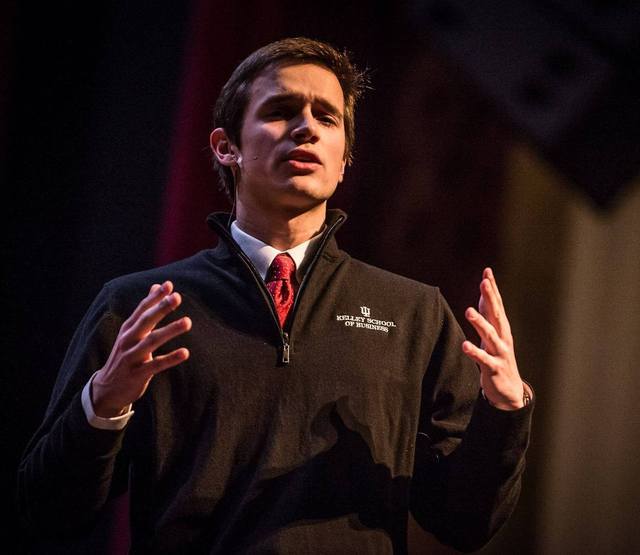TOP STUDENTS LEARN VALUE OF TEAMWORK AND SELF-AWARENESS
Why major in business? Ask 100 business majors and you’re bound to get 100 different answers. Lehigh’s Kelly Mayid, for one, appreciates the discipline’s versatility. “I was able to take such a wide variety of core business courses,” she notes. “Everything you learn—ranging from accounting to marketing—is applicable to multiple fields.” Another benefit, according to the University of North Carolina’s Theo Onigbinde, was the ability to immediately use what they learn in everything from clubs to competitions to internships. “Most of my classes had some sort of real world application and gave me skills and knowledge that will help me as I make the transition from undergrad to business professional,” he explains. For Singh Padda, business comes down to the study of the people and relationships — and how you can better understand and serve others. To him, every business discipline is, at its heart, a microcosm of making connections. “To me, business is as much about understanding and forming genuine and honest relationships and contributing value to those bonds as it is about driving strong growth and investment returns for shareholders.”
Over their four years, the Class of 2017 has absorbed bruising lessons that still confound many of their more seasoned counterparts. For many, the biggest takeaway has been the value of peers. In high school, the University of Illinois’ Olivia Bounadere concedes that she preferred studying alone, avoiding group work at all costs. Since then, her approach has taken a 180 degree turn. “I have discovered that I learn best when I study with others because we are able to teach each other concepts and talk through our ideas,” she says. Letting go of such pride brings another benefit, adds Raffy Maristela, a University of Minnesota senior ticketed for McKinsey after graduation. “I’ve realized that doing things on your own doesn’t always equate to being the most talented, and not asking for help doesn’t mean you’re the smartest person in the room,” he shares. “I’ve learned not to frown if I have to ask for help.”
The importance of self-awareness is another theme connecting this year’s best and brightest business majors. “People hire people, not skills,” exhorts Texas Christian University’s Adam Beasley. “Understand yourself and others and you will go far.” That starts with reaching out and showing interest in others, says Penn State’s Karen Burlingame. “Having a positive and encouraging attitude is instrumental to being successful,” she counsels. “As Mother Teresa puts it, ‘We shall never know all the good that a simple smile can do.’”
Indeed, it is the small things that matter to the graduating class, particularly when it comes to leaders, whose words and actions are endlessly dissected for hidden meanings. This class’ message to the c-suite: We’re watching. “Everything starts with you,” Wake Forest’s Jake Teitelbaum points out. “Every decision and action creates precedent for your employees.”
Increasingly, business majors are also rejecting the imperial and all-knowing leadership model. That is slowly changing how leadership is defined. What makes a good leader these days, you ask? Ohio State’s Michael Inman, for one, believes leadership comes down to fostering a more inclusive approach that harnesses talent and invests everyone in the outcome. “A good leader enables the work of a team to surpass what is possible from the sum of its individual members,” he says.
THEIR BEST ADVICE: “KEEP AN OPEN MIND”
Looking back, the Class of 2017 has its regrets. Before entering business school, Brigham Young University’s Nick Kerr admits that he was too hung up on grades; the pursuit of perfection cut into the time that he could’ve spent pursuing more “meaningful” extracurricular activities. At the University of Richmond, Emily Woo wishes she hadn’t been scared away by difficult courses, noting that a good professor can turn dry and difficult material into something that engenders passion and understanding. They would’ve also started sooner in some areas. Mayid, for instance, wouldn’t have waited until the end of her sophomore year to hit recruiting events. “Turns out, a good number of people started going as freshmen and even landed freshman internships from it.”
That said, some graduates, such as Michigan State’s Kari Jurewicz, wouldn’t change a thing. “Entering into business school with a fresh mind, eagerness, and curiosity allowed me to take advantage of every learning opportunity,” she explains. “Not knowing what would happen for my future continuously motivated me to ensure I worked hard for where I wanted it to be.”
That doesn’t mean that they’re shy about offering advice for future business majors. Like many graduating seniors, Indiana University’s Alejandro Mestre urges his successors to keep an open mind. “Do not be afraid to take risks and go outside of your comfort zone,” he advocates. “Undergraduate business school is an excellent time to try new things and learn from your mistakes.” “Be a sponge and soak it all in,” adds Ummat in a variation of this same theme. “This is the only time in your life that you have, to focus exclusively on learning. It won’t come again.”
Long-term, the University of Tennessee’s Caitlin Boone argues that it is foolish to think you know what you want to do for the rest of your career when you’re just 20. That means never discounting something on face value. “Giving each fundamental business class a chance to interest you is critical in understanding where you may fit and what you may have a passion for in the business world.”
Another theme in the advice from this year’s Best & Brightest? Buck convention and do what’s right for you. Boston University’s Ellie Landsman has observed that students sometimes “follow a cookie cutter path” in hopes of achieving their dreams. In reality, the opposite is often true. “In my experience, the most successful individuals I have met, followed their passions and were not afraid to stray away from the crowd,” she says. Similarly, Emory University’s Casey Rhode implores future business majors to “do things the right way and for the right reasons,” arguing students who execute the fundamentals will ultimately reap the rewards. Just as important, adds New York University’s Jessica Guo, don’t measure yourself against others. “Make sure you have a definition of success which serves you.”
CLASS INTENDS TO DISRUPT AND HUMANIZE THE WORKPLACE
That definition involves more than a big title or a phat paycheck. Looking ahead, many graduates are looking to make an impact that reverberates far beyond the ledger. Cornell University’s Zechariah Hintz may be joining Smithfield Food’s management training program after graduation, but his ambitions extend further than running a marketing team. “I want to be the Elon Musk of the agricultural industry,” he exclaims. Georgetown’s Bserat Ghebremicael intends to bring that same disruptive spirit to the company he hopes to someday launch, which he imagines fusing “innovation, technology and social justice together.”
Others plan to take the lessons from business school back to their home countries to ease the hardships of those who follow them. In her native Jamaica, Babson College’s Allana Nelson plans to someday ply her accounting skills in the Ministry of Finance to help the underprivileged. After working at JP Morgan, Singh Padda envisions returning to Punjab to open and lead a school that gives young people an alternative to poverty and hopelessness. “Seventy percent of young adults in my home state are battling drug addiction and I aim to go back one day and persevere until I can make a difference in their lives.”
Their ideals also afford a glimpse into how the workplace will run 20 years from now. Casey Gelchion, captain of Notre Dame’s women’s boxing club, pictures working for a mission-driven organization that stresses personal growth, carries high expectations, and gives back to the community it serves. Similarly, the University of Denver’s Solongo Batsukh voices the dream of every college graduate seeking, in Steve Jobs’ words, “to put a dent in the universe.” “My dream job would be a place where I can make a difference, help others through my line of work, and create a positive impact in my community,” she writes. “A culture where I feel welcomed, valued, and respected. An environment where ideas are heard, implemented, and credited.”
Of course, some graduates are seeking their share of perks too. For example, Wedell would relish an office that allowed for dogs and midday naps. “Being able to wear shorts and t-shirts to work would also be nice,” adds Emory University’s Kyle Nelson.
Next month, the Best & Brightest business majors will be donning their caps and gowns to walk the aisle with “Pomp & Circumstance” at their backs. As they reflect on their four years, many have high hopes on how they will ultimately be remembered. Many wish to be known for their impact, altruism, or passion. However, Guo would like her classmates to remember her for carrying herself according to the values she espouses. “And I hope that doesn’t start only after graduation,” she adds, “but rather that this is what my peers would say of me now.”
Congratulations, Class of 2017! You’ve earned it!
Who were their favorite professors of the Best & Brightest? Where did they intern? Where will they be working? To find out, go to the next page for our in-depth profiles of 100 of the Best & Brightest undergraduate business majors of 2017.
DON’T MISS: POETS&QUANTS’ BEST UNDERGRADUATE BUSINESS PROGRAMS OF 2016 OR THE BEST AND BRIGHTEST BUSINESS MAJORS – CLASS OF 2016















Questions about this article? Email us or leave a comment below.